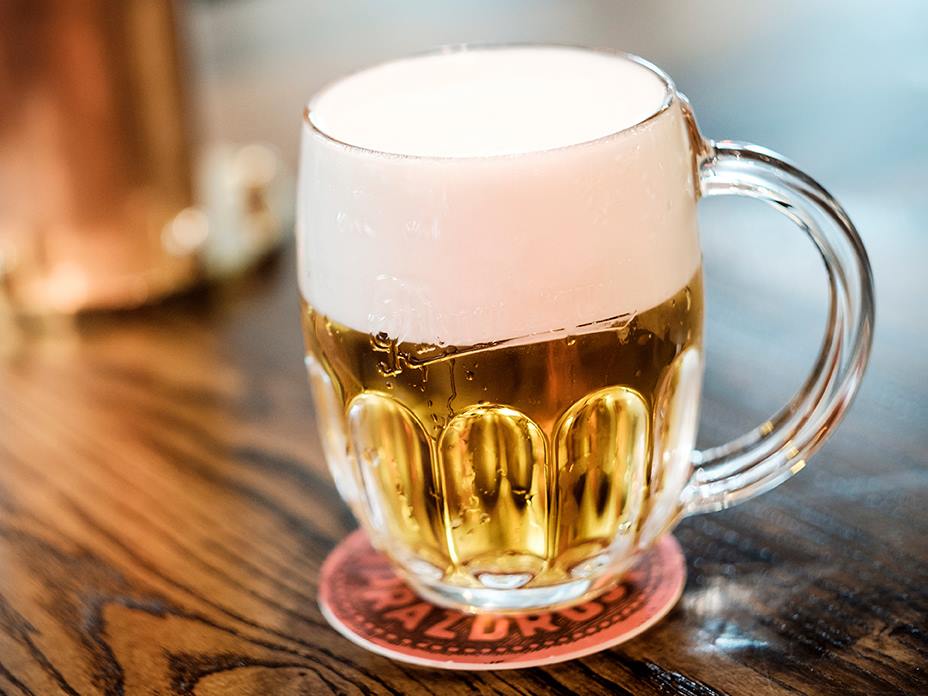|
Holsten Pils
Holsten Pils is a brand of lager, a pilsner, brewed in Northampton by Carlsberg Group. It was derived from the German ''Holsten Pilsener'', also called ''Holsten Pils'' informally, which continues to be brewed in Hamburg (northern Germany). History Holsten Brewery was founded in Altona (now a district of Hamburg) in 1879. The pilsner variety was first developed in 1953. Carlsberg bought Holsten Brewery (''Holsten-Brauerei AG'') in 2004 for around 300 million euros. Production The British product contains water, malted barley, hops and glucose syrup. The German original does not contain glucose syrup, which would be contrary to the German law of purity. It is 4.8% alcohol by volume. Production of Holsten Pils began in Northampton on Tuesday 1 November 2005. In May 2006 Carlsberg launched a draught version of Holsten Pils in a 30-litre keg. Each can has the motto ''Pure Brewing Excellence''. See also * Beer in England * Beer in Germany Beer (, ) is a major part of Ge ... [...More Info...] [...Related Items...] OR: [Wikipedia] [Google] [Baidu] |
Lager
Lager (; ) is a Type of beer, style of beer brewed and Brewing#Conditioning, conditioned at low temperature. Lagers can be Pale lager, pale, Amber lager, amber, or Dark lager, dark. Pale lager is the most widely consumed and commercially available style of beer. The term "''lager''" comes from the German word for "storage", as the beer was stored before drinking, traditionally in the same cool caves in which it was fermented. As well as maturation in Refrigeration, cold storage, most lagers are distinguished by the use of ''Saccharomyces pastorianus'', a "bottom-fermenting" yeast that ferments at relatively cold temperatures. Etymology Until the 19th century, the German language, German word ''Lagerbier'' (:de:Lagerbier, de) referred to all types of top and bottom fermenting yeast, bottom-fermented, cool-conditioned beer in normal strengths. In Germany today, it mainly refers to beers from southern Germany, either "''Helles''" (pale) or "''Dunkel#Munich Dunkel, Dunkles''" (da ... [...More Info...] [...Related Items...] OR: [Wikipedia] [Google] [Baidu] |
Pilsner
Pilsner (also pilsener or simply pils) is a type of pale lager. It takes its name from the Bohemian city of Plzeň (), where the world's first pale lager (now known as Pilsner Urquell) was produced in 1842 by Pilsner Urquell Brewery. History Origin The city of Plzeň was granted brewing rights in 1307. Until the mid-1840s, most Bohemian beers were top-brewing#Fermenting, fermented. The Pilsner Urquell Brewery, originally called in (, ), is where Pilsen beer was first brewed. Brewers had begun aging beer made with cool fermenting yeasts in caves (lager, i.e., [stored]), which improved the beer's clarity and shelf-life. Part of this research benefited from the knowledge already expounded on in a book (printed in German in 1794, in Czech in 1799) written by Czech brewer () (1753–1805) from Brno. The Plzeň brewery recruited the Bavarian brewer Josef Groll (1813–1887) who, using the local ingredients, produced the first batch of pale lager on 5 October 1842. The combinat ... [...More Info...] [...Related Items...] OR: [Wikipedia] [Google] [Baidu] |
Northampton
Northampton ( ) is a town and civil parish in Northamptonshire, England. It is the county town of Northamptonshire and the administrative centre of the Unitary authorities of England, unitary authority of West Northamptonshire. The town is situated on the River Nene, north-west of London and south-east of Birmingham. Northampton is one of the largest towns in England; the population of its overall urban area was recorded as 249,093 in the 2021 United Kingdom census, 2021 census. The parish of Northampton alone had 137,387. Archaeological evidence of settlement in the area dates to the Bronze Age Britain, Bronze Age, Roman conquest of Britain, Romans and Anglo-Saxons, Anglo-Saxons. In the Middle Ages, the town rose to national significance with the establishment of Northampton Castle, an occasional royal residence which regularly hosted the Parliament of England. Medieval Northampton had many churches, monasteries and the University of Northampton (thirteenth century), Univers ... [...More Info...] [...Related Items...] OR: [Wikipedia] [Google] [Baidu] |
Carlsberg Group
Carlsberg A/S (; ) is a Danish multinational brewer. Founded in 1847 by J. C. Jacobsen, the company's headquarters is in Copenhagen, Denmark. Since Jacobsen's death in 1887, the majority owner of the company has been the Carlsberg Foundation. The company's flagship brand is #Carlsberg, Carlsberg (named after Jacobsen's son Carl Jacobsen, Carl). The company employs around 41,000 people, primarily in Europe and Asia. Carlsberg is currently the sixth largest brewery in the world based on revenue. History Carlsberg was founded by J. C. Jacobsen, a philanthropist and admirer of science. The first brew was finished on 10 November 1847, and the export of Carlsberg beer began in 1868 with the export of one barrel to Edinburgh, Scotland. Some of the company's original logos include an elephant, after which Carlsberg Group#Elephant beer, some of its lagers are named, and the swastika, the use of which was discontinued in the 1930s because of its association with the Nazi party in ne ... [...More Info...] [...Related Items...] OR: [Wikipedia] [Google] [Baidu] |
Hamburg
Hamburg (, ; ), officially the Free and Hanseatic City of Hamburg,. is the List of cities in Germany by population, second-largest city in Germany after Berlin and List of cities in the European Union by population within city limits, 7th-largest in the European Union with a population of over 1.9 million. The Hamburg Metropolitan Region has a population of over 5.1 million and is the List of EU metropolitan areas by GDP, eighth-largest metropolitan region by GDP in the European Union. At the southern tip of the Jutland Peninsula, Hamburg stands on the branching River Elbe at the head of a estuary to the North Sea, on the mouth of the Alster and Bille (Elbe), Bille. Hamburg is one of Germany's three city-states alongside Berlin and Bremen (state), Bremen, and is surrounded by Schleswig-Holstein to the north and Lower Saxony to the south. The Port of Hamburg is Germany's largest and Europe's List of busiest ports in Europe, third-largest, after Port of Rotterdam, Rotterda ... [...More Info...] [...Related Items...] OR: [Wikipedia] [Google] [Baidu] |
Holsten Brewery
Holsten Brewery (Holsten-Brauerei AG) is a brewing company founded in 1879 in what is now Hamburg's Altona-Nord quarter. The group now has seven breweries in Germany. Its nationally distributed premium brand is the pale lager ''Holsten Pilsener''. The company was acquired by the Carlsberg Group in 2004. History In 1902, Holsten Brauerei bought the Union Brewery, Point Pleasant, Wandsworth on the south bank of the River Thames in London. Trade suffered from anti-German sentiment during the First World War and it closed in 1920. Holsten Pils was first imported into the UK in 1952, creating the premium packaged lager market. In 1979 the first of many award-winning TV ad campaigns was launched featuring actor Donald Pleasence and in the mid-1980s Holsten became the UK's number one selling premium packaged lager. In 1991, Holsten acquired the Mecklenburgische Brauerei Lübz. Until 1999, Holsten UK operated as a joint venture between Holsten Brauerei and Scottish & Newcastle, bu ... [...More Info...] [...Related Items...] OR: [Wikipedia] [Google] [Baidu] |
Altona, Hamburg
Altona (), also called Hamburg-Altona, is the westernmost Boroughs and quarters of Hamburg#Boroughs, urban borough (''Bezirk'') of the Germany, German States of Germany, city state of Hamburg. Located on the right bank of the Elbe river, Altona had a population of 270,263 in 2016. From 1640 to 1864, Altona was under the administration of the Denmark, Danish monarchy. Altona was an independent borough until 1937. History Danish period Altona was founded in 1535 as a village of fishermen in what was then Holstein-Pinneberg. In 1640, Altona came under Denmark-Norway, Danish rule as part of Holstein-Glückstadt, and in 1664 was granted town rights, municipal rights by the Danish King Frederik III of Denmark, Frederik III, who then ruled in personal union as Duke of Holstein. Altona was one of the Danish monarchy's most important harbor towns. The railway from Altona to Kiel, the Hamburg-Altona–Kiel railway (), was opened in 1844. Imperial period The wars between Denmark ... [...More Info...] [...Related Items...] OR: [Wikipedia] [Google] [Baidu] |
Glucose Syrup
Glucose syrup, also known as confectioner's glucose, is a syrup made from the hydrolysis of starch. Glucose is a sugar. Maize (corn) is commonly used as the source of the starch in the US, in which case the syrup is called "corn syrup", but glucose syrup is also made from potatoes and wheat, and less often from barley, rice and cassava.p. 21 Glucose syrup containing over 90% glucose is used in industrial fermentation, but syrups used in confectionery contain varying amounts of glucose, maltose and higher oligosaccharides, depending on the grade, and can typically contain 10% to 43% glucose. Glucose syrup is used in foods to sweeten, soften texture and add volume. By converting some glucose in corn syrup into fructose (using an enzymatic process), a sweeter product, high fructose corn syrup can be produced. Glucose syrup was first made in 1811 in Russia by Gottlieb Kirchhoff using heat and sulfuric acid. Types Depending on the method used to hydrolyse the starch and on ... [...More Info...] [...Related Items...] OR: [Wikipedia] [Google] [Baidu] |
Reinheitsgebot
The (; ) is a series of regulations limiting the ingredients in beer in Germany and the states of the former Holy Roman Empire. The best known version of the law was adopted in Bavaria in 1516 (by William IV), but similar regulations predate the Bavarian order, and modern regulations also significantly differ from the 1516 Bavarian version. Although today the is mentioned in various texts about the history of beer, historically it was only applied in the duchy, electorate, then Kingdom of Bavaria and from 1906 in Germany as a whole, and it had little or no effect in other countries or regions. 1516 Bavarian law The most influential predecessor of the modern was a law first adopted in the Duchy of Bavaria-Munich in 1487. After Bavaria was reunited, the Munich law was adopted across the entirety of Bavaria on 23 April 1516. As Germany unified, Bavaria pushed for adoption of this law on a national basis (see ). Ingredients permitted According to the 1516 Bavarian law, the o ... [...More Info...] [...Related Items...] OR: [Wikipedia] [Google] [Baidu] |
Beer In England
Beer has been brewed in England for thousands of years. As a beer brewing country, it is known for top fermented cask beer (also called real ale) which finishes maturing in the cellar of the pub rather than at the brewery and is served with only natural carbonation. English beer styles include bitter, mild, brown ale and old ale. Stout, porter and India pale ale were also originally brewed in London. Lager increased in popularity from the mid-20th century. Other modern developments include the consolidation of large brewers into multinational corporations; the growth of beer consumerism; and the expansion of microbreweries and bottle-conditioned beers. History Romano-Celtic Britain Brewing in what is now England was probably well established when the Romans arrived in 54 BC, and certainly continued under them. In the 1980s, archaeologists found the evidence that Rome's soldiers in Britain sustained themselves on Celtic ale. A series of domestic and military account ... [...More Info...] [...Related Items...] OR: [Wikipedia] [Google] [Baidu] |
Beer In Germany
Beer (, ) is a major part of German culture. According the Reinheitsgebot (German beer purity law), only water, hops, yeast and malt are permitted as ingredients in its production. Beers not exclusively using barley-malt, such as wheat beer, must be top-fermented. In 2023, Germany ranked fourth in beer exports and in 2020, Germany ranked third in Europe in terms of per-capita beer consumption, trailing behind the Czech Republic and Austria. Styles Pale lagers *Pilsener is a pale lager with a light body and a more prominent hop character, is the most popular style, holding around two-thirds of the market. It has an alcohol content of 4.5–5% ABV and 11–12° Plato. *Märzen is a medium-bodied, malty lager that comes in pale, amber, and dark varieties. 13–14° Plato, 5.2–6% ABV. This type of beer is traditionally served at the Munich Oktoberfest. *Export is a pale lager brewed around Dortmund, and is fuller, maltier, and less hoppy than Pilsner. 12–12.5° Plato, 5� ... [...More Info...] [...Related Items...] OR: [Wikipedia] [Google] [Baidu] |
Carlsberg Brands
Carlsberg may refer to: Places * Carlsberg (district), a district in Copenhagen, Denmark ** Carlsberg station, its train station * Carlsberg, Germany, a municipality in Rhineland-Palatinate, Germany * Carlsberg Fjord, Greenland Other uses * Carlsberg Group, a Danish brewing company founded in 1847 ** Carlsberg Lager ** Carlsberg Foundation, a Carlsberg Group shareholder and funder of the Carlsberg Laboratory *** Carlsberg Laboratory, a Danish laboratory for advancing biochemical knowledge * Carlsberg Cup (other), several association football competitions sponsored by the Carlsberg Group * 5890 Carlsberg, an asteroid See also * Ny Carlsberg Glyptotek, an art museum in Copenhagen, Denmark * Karlsberg (other) Karlsberg may refer to: * Karlsberg Brewery (since 1878, alias ''Karlsbräu''), in Homburg, Saarland, Germany * Karlsberg Castle (1778–1793), a ruin in Homburg, Saarland, Germany * Karlsberg Hill, near the German city of Homburg, Saarland See ... [...More Info...] [...Related Items...] OR: [Wikipedia] [Google] [Baidu] |









